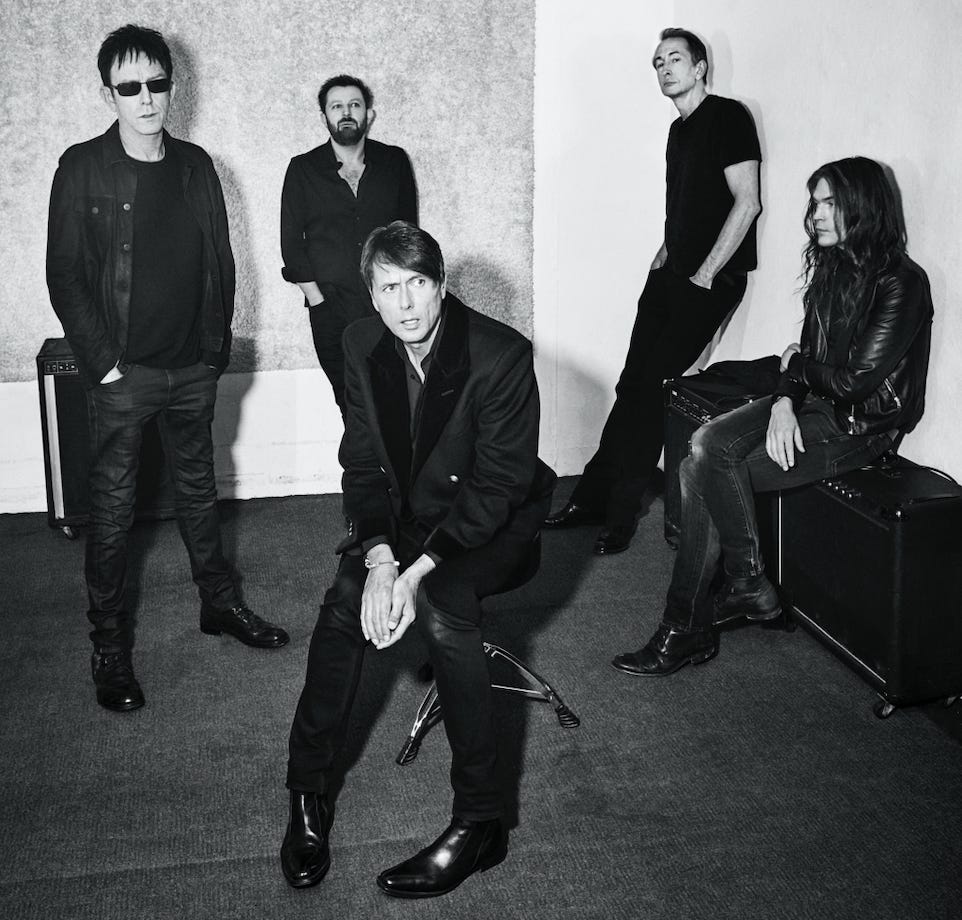Good morning TNC crew!
On Monday, we were supposed to run a nice Start The Week With… chat with Suede frontman Brett Anderson but we didn’t, things were going on. But rather than hold onto it for another week, we thought we’d deliver it today as a freebie extra. We haven’t called it Start The Week With… because it’s Wednesday, the middle of the week. If you’re reading after lunch, it’s closer to the weekend. Party!
Don’t get too excited, freeloaders: after this, normal service will be resumed with our Monday edition free and our Wednesday and Friday editions for paying subscribers only. TNC subscribers pay £5 a month for the privilege and you should join them if you know what’s good for you.
OK, onto Brett, enjoy the edition,
Ted, Niall and Chris
Line One: Brett Anderson
Last week, Suede released their ninth album Autofiction. It’s their most amped-up and anthemic record since reuniting in 2010, a return to the urgent, widescreen rock of their early days after the gothic experimentalism of 2018’s The Blue Hours. Earlier this year, the band celebrated the 30th anniversary of their era-defining debut single The Drowners and Autofiction shows they’re still a thrilling and vital creative force. On a sunny Wednesday morning a few weeks ago, frontman Brett Anderson told Niall all about it.
Hello Brett. Where are you at the moment?
Hello Niall. I am in London, in Notting Hill.
How’s your morning been so far?
What did I do this morning? I went to the park, took the dog out, I’m having a coffee, chatting to you, enjoying the day. I’m going back to the country - we live in the country but we have a flat in Notting Hill so it’s backwards and forwards between Somerset and west London.
Nice. The new record is great, well done.
Thank you, I’m very proud of it.
How do you look back on the general process of making it?
Well, it was a long record to make, strangely enough. Because it’s quite short and carefree-sounding, it gives the impression that it was made quickly, but it wasn’t. We spent years writing it, literally years, I think we started in 2018 and finished writing this year. The very last song was Turn Off Your Brain And Yell, which we started writing for the next album and then we wrote it and I thought, ‘Oh, this really fits Autofiction, we’ve got to have it on’, so we recorded it just before the deadline.
We always write a lot, it’s just the way it is. It’s the dynamic of how the creative thing works with Suede now, we spend a lot of time writing. I quite like that, it just meant that we had lots of good songs to pick from. What happened was we made an album and then lockdown and happened and we were told that we couldn’t finish it and release it, obviously, so we just carried on writing. It was actually a really good thing to happen, because we thought we’d finished an album, but we really had half an album.
How much did it change course?
We just wrote some more songs, but some really key songs - She Still Leads Me On, What Am I Without You?, Shadow Self, Turn Off Your Brain And Yell and maybe one other, so pretty much half the album and then realised that, ‘oh, this is actually a much better record we’ve got now’, so we were actually quite glad of that. I don’t think it changed course sonically or anything because we had a quite a clear idea of the record we wanted to make, but we just made it better.
A lot of it feels like it’s looking back, both lyrically and sound-wise.
Well, yes and no. Obviously something like 15 Again, there’s a suggestion that it’s nostalgic and I use the framework of nostalgia, but it’s more about those times in life when life is wonderful. You know, it’s almost like You Make Me Feel So Young, that Frank Sinatra sort of thing, it’s like an updated version of that, that’s the message of that song so it’s not a purely nostalgic song. She Still Leads Me On is a song about my mother, so I was reflecting. I wanted it to be about what it feels like to be a 55-year-old man and I wanted to be quite honest about that. Lots of my state as a 55-year-old man is about reflecting on my life, because I’m very, very far away from the start of my life now and it’s just naturally what you do. I wanted to write a write an album that was about the fragility of being a 55-year-old man. I think there’s a tendency to believe that as you get older, you become more comfortable, and in some ways you do and in some ways you become less comfortable as you start to plummet towards death. Life and family life is simultaneously a comfort and also a source of anxiety because there’s so much more responsibility you have as a parent. I wanted to bring that into it, and the fragility of long-term relationships as well.
I think there’s a certain tendency for rock and pop writers to sing about the start of a relationship or the end of a relationship. Those are the dramatic moments - when you first fall in love or when you fall out of love. I wanted to try and touch on how it feels to be in the middle of a relationship and the fragility of that, so a song like Black Ice is very much about that, trying to juggle and maintain a relationship and keep it alive. I didn’t want to write a rock record that was pretending to be from the point of view of a 25-year-old man.
In exploring that, did you discover anything about yourself?
I can’t really put my finger on what I discovered about myself in a pithy quote, but it’s all part of the process of getting to know yourself better. I wrote a couple of memoirs a couple of years ago and that was really, genuinely helpful for me as a human being to get to know myself, sorry, I’m starting sound like a Californian guru or something. But these things are cliches because they’re true and I feel as though I know myself better. It’s a strange thing because you think, ‘well, how can I not know myself?’ but you kid yourself about yourself sometimes, it’s all part of the process of trying to find out who you are.
You touched on She Still Leads Me On There. Your mum died when you were in your early twenties, how long has that song been in you waiting to come out?
That’s a great question because I think in lots of ways, the really good songs are waiting. They’re like seeds that are growing in you all the time, you’re reaching for the way to express these feelings. I guess it had been growing in me since my mum died. I wanted the song to be about loss but not about grief, I wanted it to be about the strength that someone can give you even though they’re not around to hold your hand, a different kind of strength, a way that they can guide you through life, almost like their memory can somehow give you strength. It’s a companion piece to a song on the last album called Life Is Golden, which is a song I wrote about my son. Life Is Golden written from the parent to the child, and She Still Leads Me On is a song written from the child to the parent. They go hand-in-hand for me.
What was the best piece of advice that your mum gave you that you still carry with you today?
She gives me advice in my dreams sometimes. I remember I had this very vivid dream of when we wrote So Young and my mum saying, “it’s too long! You’ve gotta shorten it! It’s too many different bits!”
Did you take the advice?
I chopped a bit out of it, yeah! There was an extra bit that I chopped out.
Tell me a little bit about Drive Myself Home, a haunting, slow centrepiece in the middle of an otherwise full-throttle record?
I think it’s a necessary gear change because I think otherwise the listener is in danger of being worn down by this onslaught. I’m always very conscious of the landscape of an album, I’m always thinking about the listener listening to the whole album rather than just bits of it. Drive Myself Home does a specific job of just calming everything. Obviously, the album is very far from punk and lots of people that have misunderstood what I said about the album when I said it’s our punk record, they hear me saying it’s a punk record, but it’s not a punk record, it’s our version of punk, it’s us taking punk sensibilities and all the rough edges and putting it through a Suede lens. We’re not supposed to be aping a genre with this record, it’s still very much a Suede record and Drive Myself Home is very much a Suede ballad. It’s something that we have as part of our USP, we do those sad, lonely ballads.
Why did you feel that now was the time to make an album like that?
I think because we made two quite long, complex, vaguely conceptual records and we didn’t want to make another one. You’re always reacting to the last record in some way and I thought taking another step further left field and making an odder, more complex record wasn’t what we wanted to do. At times, as an artist you’re always looking for that sort of naivety again, you’re always searching for that wonderful exuberance that you can only get when you’re when you first start, a constant search for naivety. There’s a paradox, because as you get more sophisticated as an artist and able to do things and more competent, you’re simultaneously always yearning for those early days. I think this record is an attempt to access that naivety again, that primal feeling you get when you’re first in a band and it’s incredibly exciting.
Do you think of Suede as a singular artistic entity or as different versions of the same band who can go from The Blue Hour into something like this?
There’s quite a lot of range within what we do. We can do three things quite well, I think. We do this thing, rock, pop, punk, whatever you want to call it, a combination of those three things, we can do the emotional torch song thing, things like Still Life, and we can do strange quite well as well now. There’s things on The Blue Hour that are quite strange, things like Roadkill. I like having those three points to bounce between, that’s what we do.
Did you do anything to celebrate the 30th anniversary of The Drowners earlier this year?
It’s always bad timing with these things. We were in Sweden doing a Coming Up tour when that happened and we played the whole Drowners EP, so we did actually but we should’ve done more. If it had been at the right time, I would’ve like to have done a special show because I do think The Drowners was a key record. I think it changed a lot of things for a lot of people, especially us.
You’ll have to save it for the 40th anniversary.
Maybe yeah, it’s always bad timing. When the debut album had its 20th anniversary, it was literally the week that Bloodsports was released. It’s never quite the right time for these things. Which is probably quite good, isn’t it?
ND




